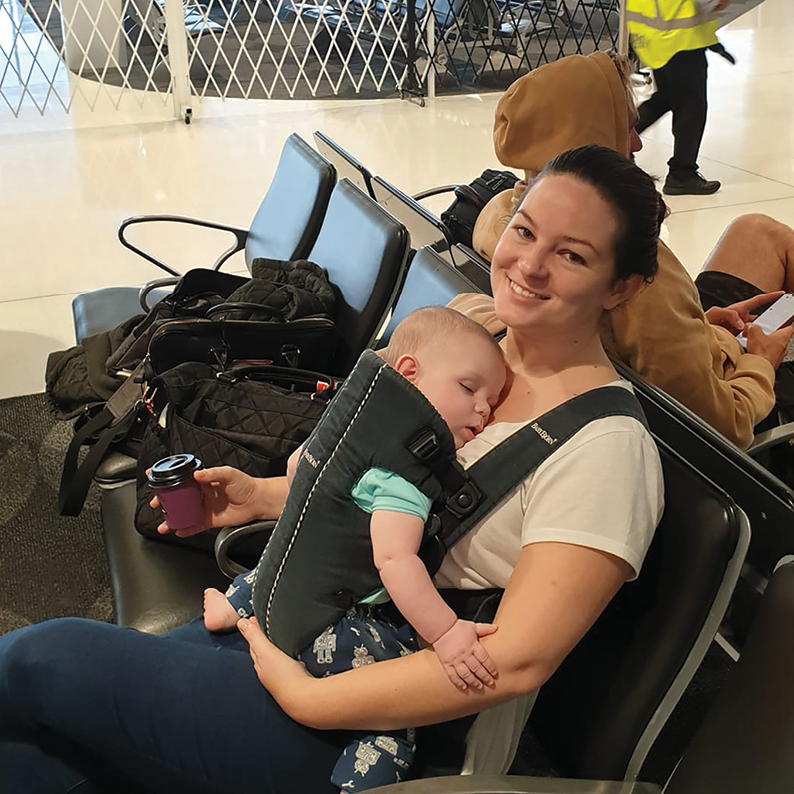The Parental Pause: A season of sacrifice
Changes to the Government’s parental leave scheme have created a positive ripple effect in private firms across Australia, with an increasing number implementing greater support for families. How is the profession retaining practitioners at this critical stage of their lives and careers?
When CEO and Founder of Her Lawyer Courtney Bowie was pregnant with her son in 2019, she was afflicted with extreme morning sickness, a condition known as hyperemesis gravidarum, meaning she could barely work.
Her business, the first commercial law firm in Australia to be both female-focused and 100 per cent virtual, was also an infant and on the cusp of growth, having been operational for less than two years. After Bowie unexpectedly fell pregnant, her husband quit his fulltime job in sales to join the firm as its practice manager.
“I would take a call with a client in my bed, and I would have to put them on hold while I vomited in the bathtub. It was so bad, and I was hospitalised,” Bowie tells the Journal.
“My husband and I were thinking, ‘what have we done and how are we going to survive?’”
“My husband and I were thinking, ‘what have we done and how are we going to survive?’.”
After giving birth, Bowie took only six weeks’ parental leave, not because she felt well enough to return to work, but because she felt there was “no other option” to keep her business afloat and support her family.
“My husband and I were home together. He was working in the office, which was our spare room, and would come out during the day to ask me questions so we could keep the business going. We had an amazing lawyer help us. But, because the pregnancy was unplanned and I was unwell, we did not have enough time to find her, train her and set her up for success. We crawled to the end of those six weeks.”

The entrepreneur speaks openly about the challenges and joys of juggling motherhood and business, particularly through the added stress of the turbulent pandemic years. Bowie tells the Journal the main lesson learnt from this period of her life is that she had not given enough thought to how her business could run without her when it needed to. Bowie says she would like to see managing this situation as a topic in mandatory practice management courses that solicitors must undertake before becoming a principal of a firm.
“What are you going to do to continue to support your family if you can’t work? Or if something comes into your life adding more responsibility? Whether that is a new child, or an ageing parent who needs you. You are a person first, not a lawyer or a business owner. Most sole practitioners became one to be freer, so how can you build something for yourself that gives you that freedom?”
Legal recruiter Shaaron Dalton says the period when solicitors become parents is a “key trigger point” for retention in the profession, and sees many practitioners leave around this time.
“Having children is a major life change, and people have other life changing events also. Now firms are starting to factor these big life changes into the way they support their staff,” Dalton says.
“Firms are trying to come to the party to support people throughout their personal lifecycle, as well as their career lifecycle. It takes a takes a village to raise a child, but it also takes a village to support a person. Especially if a firm is expecting someone to spend 10 hours a day tied to their desk: then they need to offer staff the opportunity to be supported through the really hard times.”
Creating a level playing field
The Federal Government’s current Paid Parental Leave scheme provides eligible working parents (primarily mothers) with up to 18 weeks of pay. Dad and Partner Pay offers two weeks.
But from 1 July 2023 the scheme is changing to combine the two schemes so that eligible parents can split 20 weeks’ leave between them. By 2026, this will increase to 26 weeks. The legislation change will remove any notion of “primary” and “secondary” caregivers.
Dalton says private firms are also starting to implement major changes to their parental leave policies not only to better support staff, but also because they want to be at “the forefront of the war for talent”.
Gadens offers permanent employees 30 weeks’ paid leave irrespective of gender identity, from their first day at the firm. Baker McKenzie also offers staff 26 weeks’ parental leave for all its Australian employees, which can be used in blocks within the first two years of the birth or adoption of the child. This was increased from 18 weeks in June 2022.
“I can look back at the day when, if you went on parental leave, you lost your client base. Lawyers have never had it so good. But society has changed and people’s perceptions of what they are prepared to do have changed,” Dalton says.
“Working from home as a result of COVID was not a disaster for law firms. So hence it’s given firms confidence to build on that flexibility model and to create a hybrid arrangement where people can enjoy both flexibility and touch point at the office.”

When the Journal speaks with Nicholas Kraegen, a Senior Associate at Baker McKenzie specialising in media law, he has recently returned from a stint of parental leave with his second child, born in September 2022. Kraegen agrees with Dalton’s comments, adding that if firms don’t adopt progressive policies they will instead be “drawing their talent from a more constrained pool” and ultimately be left behind.
“There is a reason male persons taking parental leave comes up in the conversation about gender equity. I think if I didn’t have this opportunity, the burden would fall far more disproportionately on my partner than it has already,” Kraegen says.
“Hopefully what firms are creating is a generation of men and women who view parenting as something that everyone should have equal opportunity to do and participate in. Parenting is something that may happen for someone in the context of a long career, and even as we work harder and faster in the modern world, it is always going to be an important and sacred thing.”
Kraegen says Baker McKenzie’s supportive parental policy has given him invaluable “space and time” to “stop and evaluate” how his personal and professional lives can work together.
“I spent my first five years of legal practice working hard and learning. Then, when my first child came along, it would have been very difficult to only have two weeks off and then suddenly be thrown back into work and either sink or swim with the new dynamic,” Kraegen says.
“I have a good relationship with the partner I work with. He is extremely supportive of the leave I have taken and that I will take. I feel like I am involved in the conversations about the larger objectives of the practice, and I understand how my leave fits in to that. I don’t feel like that compromises my professional progress in any way.”
“One of the many aspects of male privilege is that you don’t have highly structured and developed expectations put on you socially in terms of what your parenting is supposed to look like. I have been able to chart my own course through that quite independently of any social pressure. I won’t purport to speak to women’s experiences, but I think women are in a different position when it comes to that.”
“One of the many aspects of male privilege is that you don’t have highly structured and developed expectations put on you socially in terms of what your parenting is supposed to look like.”
Paid maternity leave entitlements
OECD figures at national/federal level, for 2022 (Australia from July 2023)
| Country | Number of weeks | Average payment rate (%) | Full-rate equivalent (weeks) |
| USA | 0 | 0.0 | 0.0 |
| Ireland | 26 | 25.7 | 6.7 |
| Australia | 18 (20 if split with partner) |
43.1 | 8.6 |
| Japan | 14 | 67.0 | 9.4 |
| UK | 39 | 29.5 | 11.5 |
| New Zealand | 26 | 48.9 | 12.7 |
| Germany | 14 | 100.0 | 14.0 |
| France | 19 | 91.4 | 14.6 |
| Netherlands | 16 | 100 | 16.0 |
| Italy | 21.7 | 80.0 | 17.4 |
| Chile, Colombia, Norway |
18 | 100 | 18.0 |
| Iceland | 26 | 71.3 | 18.5 |
| Hungary | 24 | 100 | 24.0 |
| Greece | 43 | 65.1 | 28.0 |
| Luxembourg | 20 | 100 | 20.0 |
| Mexico | 12 | 100.0 | 12.0 |
| Poland | 20 | 100.0 | 20.0 |
Bowie agrees with Kraegen’s comments about societal pressure on working mothers. She says the changes to parental leave are important steps on the way to a broader cultural transformation about gender equality in the profession. Moreover, Bowie says that if both genders are on equal footing, it will remove the anxiety that plagues many parents when confronted with the decision about when to return to work after having children.
“As a profession, we think working all the time is what makes us good at our job. That is untrue. We must shift the way we think about the value of our profession. Is it because we are always available and always working? Is that the value we provide to our clients? Absolutely not. They say if you are happy, you are more productive. If you are driving yourself into the ground, working full time and trying to parent in the gaps, you are going to be terribly unproductive at work.
“If I work full time, I’m a bad parent. If I work part time, I am a bad lawyer. Why can’t I be good parent and a good lawyer at the same time? Why can’t I be both?
Read more
Part One – Early Career: Starting out in law can be tough, with gratification clouded by long hours and paperwork. Two junior solicitors share how they are finding passion and purpose, amid calls from experts to create better structures to support the profession’s future leaders.
COMING SOON
Part Three – Senior Lawyers: What keeps people in this demanding profession at the senior level? How have they managed to sustain that early dream of making a difference, attaining a prestigious position, and managing the work–life balance?
Part Four – Retirement: What happens at the latter end of a long legal career? Meet three people whose years of practice have brought new learnings on life in the law – and beyond.




